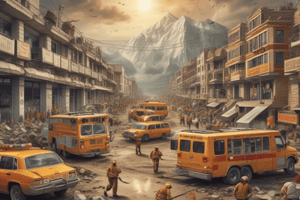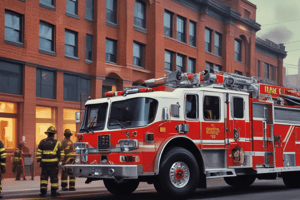Podcast
Questions and Answers
What is the primary defensive priority during a defensive fire operation?
What is the primary defensive priority during a defensive fire operation?
- Firefighter safety (correct)
- Exposure protection
- Tactical communication
- Water supply management
How should Division Officers manage the defensive perimeter during operations?
How should Division Officers manage the defensive perimeter during operations?
- The height of neighboring structures
- At the height of the structure
- 1 ½ times the height of the structure (correct)
- Twice the height of the structure
What should Division Officers do with small-diameter handlines during defensive operations?
What should Division Officers do with small-diameter handlines during defensive operations?
- Leave them operational for safety reasons
- Increase their use at all times
- Shut them down unless protecting exposures (correct)
- Redirect them to direct attack lines
What is the purpose of a face-to-face briefing with the Division Officer?
What is the purpose of a face-to-face briefing with the Division Officer?
Why is water supply critical in managing defensive operations?
Why is water supply critical in managing defensive operations?
What happens to operational units during a defensive fire scenario?
What happens to operational units during a defensive fire scenario?
What should the command do regarding resource allocation once the organization is implemented?
What should the command do regarding resource allocation once the organization is implemented?
What characterizes a defensive situation in fire management?
What characterizes a defensive situation in fire management?
What is the primary focus of the organization mentioned?
What is the primary focus of the organization mentioned?
Which organizational level is responsible for coordinating overall operational control?
Which organizational level is responsible for coordinating overall operational control?
Which level of organization performs work directly in the hazard zone?
Which level of organization performs work directly in the hazard zone?
What is the role of Division Officers at the Tactical level?
What is the role of Division Officers at the Tactical level?
Who typically manages all three organizational levels at local incidents?
Who typically manages all three organizational levels at local incidents?
What does the Task level primarily focus on?
What does the Task level primarily focus on?
Which component is NOT part of the general guidelines mentioned?
Which component is NOT part of the general guidelines mentioned?
What is the least important organizational level according to the provided information?
What is the least important organizational level according to the provided information?
What terminology is used to refer to the individual floor equivalent to its division number?
What terminology is used to refer to the individual floor equivalent to its division number?
What is one of the primary roles of a Division Officer in managing the Tactical requirements?
What is one of the primary roles of a Division Officer in managing the Tactical requirements?
Which function is NOT a responsibility of a Division Officer in managing Embedded Safety?
Which function is NOT a responsibility of a Division Officer in managing Embedded Safety?
How many companies can a single Division Officer typically supervise in an IDLH hazard zone?
How many companies can a single Division Officer typically supervise in an IDLH hazard zone?
What is the primary reason personnel cannot enter a structure under defensive fire conditions?
What is the primary reason personnel cannot enter a structure under defensive fire conditions?
What should a Division Officer do if more companies are needed beyond their current span of control?
What should a Division Officer do if more companies are needed beyond their current span of control?
What is a key consideration when deploying units into an IDLH hazard zone?
What is a key consideration when deploying units into an IDLH hazard zone?
Which term best describes a geographical subdivision of the incident site?
Which term best describes a geographical subdivision of the incident site?
Which basic function involves redirecting the Division's activities as needed?
Which basic function involves redirecting the Division's activities as needed?
How must command manage the assignment of companies at an emergency scene?
How must command manage the assignment of companies at an emergency scene?
In tactical subdivisions, which term represents a functional work group not tied to a specific location?
In tactical subdivisions, which term represents a functional work group not tied to a specific location?
What does a Division Officer do to maintain Tactical control during an incident?
What does a Division Officer do to maintain Tactical control during an incident?
Which side of a structure is designated as the Alpha side?
Which side of a structure is designated as the Alpha side?
What should be done if there is confusion regarding the building's landmark?
What should be done if there is confusion regarding the building's landmark?
How are structures exposed to the main fire occupancy identified?
How are structures exposed to the main fire occupancy identified?
What is the primary tactical guideline regarding groups assigned in the hazard zone?
What is the primary tactical guideline regarding groups assigned in the hazard zone?
What is the primary purpose of upgrading the operational levels during an incident?
What is the primary purpose of upgrading the operational levels during an incident?
Who assumes the strategic level of command upon arrival and command transfer?
Who assumes the strategic level of command upon arrival and command transfer?
What does the '2 bottle' rule refer to in hazardous zones?
What does the '2 bottle' rule refer to in hazardous zones?
How should the Division Officer's plan relate to the Incident Commander's plan?
How should the Division Officer's plan relate to the Incident Commander's plan?
What does the '3-deep' deployment model ensure?
What does the '3-deep' deployment model ensure?
What is a key responsibility of officers in the hazard zone related to air supply?
What is a key responsibility of officers in the hazard zone related to air supply?
What is one of the primary goals of resource deployment during an incident?
What is one of the primary goals of resource deployment during an incident?
What is the critical factor assessed by Division Officers continuously?
What is the critical factor assessed by Division Officers continuously?
Flashcards are hidden until you start studying
Study Notes
Incident Command System (ICS) Structure
- Three organizational levels: strategic, tactical, and task
- Strategic level: Incident Commander (IC) and Command Team operate from a stationary command post, responsible for overall operational control, incident strategy, and Incident Action Plan (IAP) development.
- Tactical level: Division Officers manage tactical deployment and supervision of resources in designated geographical areas.
- Task level: Firefighters perform work within the hazard zone supervised by Company Officers.
First Arriving Officer
- Initial Incident Commander, typically the first arriving Engine Company Officer.
- Responsible for managing all three organizational levels.
- Command may be transferred to arriving Battalion Commander, who assumes responsibility for the strategic level.
Offensive Hazard Zone Tactical Level Supervision
- Division Officer responsibilities:
- Develop and implement Division's Incident Action Plan (IAP) within IC's overall strategy.
- Ensure actions match conditions and align with Risk Management Plan (RMP).
- Supervise work within the Division.
- Request additional resources from the IC, maintaining a tactical reserve.
- Coordinate with other Divisions.
- Provide progress reports to IC.
- Monitor personnel safety, accountability, and welfare.
- Release companies as operations are completed.
- 2 Bottle Rule: Crews recycle once and report to rehab after their second bottle is depleted.
- 3-Deep Deployment Model: Ensure a steady flow of resources with a ready-to-go company On Deck and a tactical reserve staged.
- Communication Streamlining: Direct communication between exiting and relieving companies reduces radio traffic.
Defensive Hazard Zone Tactical Level Supervision
- Defensive Situation: Incident has evolved to the point where lives and property are no longer savable. Offensive tactics are ineffective or unsafe.
- Top Priority: Firefighter safety. No firefighter should be injured on a defensive fire.
- Arrangement: Arrangement of the main fire compartment/area in relation to exposures dictates operating positions.
- Exposure Protection: Immediate and anticipated exposures must be identified, searched, and protected.
- Perimeter and Collapse Zone: Defensive perimeter and collapse zone must be identified, and all operating units must remain behind those boundaries.
- Water Supply: Continuous water supply with sufficient flow is critical for exposure protection and controlling the fire.
- Handlines: Shut down small-diameter handlines except for direct exposure protection. Prioritize water for master-stream devices.
- Entry Restriction: No entry into the hazard zone of a defensive fire area. Overhaul or loss control is prohibited following defensive fire conditions.
Subdividing the Incident Scene
- Tactical Subdivisions: Divisions or Groups (D/G) used to manage the incident scene for Type 4 and 5 local incidents.
- Division: Geographical subdivision.
- Group: Functional work group not tied to a specific location.
- Geographic Landmarks: Alpha side is designated as the front door unless otherwise indicated. Subsequent sides are named clockwise (Bravo, Charlie, Delta).
- Exposures: Structures exposed to the main fire occupancy are identified by their proximity to the main fire occupancy sides (Alpha, Bravo, Charlie, Delta) and numbered starting with the closest exposure.
- Floors: Identified by stories above and below ground level. Divisions adopt the same floor number. Basements are identified as "basements."
Division Officer Responsibilities
- Tactical Responsibilities:
- Size-up the Division's critical factors.
- Apply the risk management plan.
- Develop the Division's Incident Action Plan.
- Supervise work in the Division.
- Redirect Division activities.
- Request resources from the IC.
- Coordinate with other Divisions.
- Provide progress reports to IC.
- Embedded Safety Responsibilities:
- Manage Division accountability.
- Assist with company rotation.
- Manage On Deck crews.
- Manage crew recycle and rehab.
- Monitor safety hazards.
Span of Control:
- One Division Officer can manage both tactical and embedded safety requirements for a Division.
- Maximum span of control for one Division Officer is 5 companies in an IDLH hazard zone.
- If more companies are needed, the IAP needs to be reevaluated, and the incident command structure should be expanded.
Studying That Suits You
Use AI to generate personalized quizzes and flashcards to suit your learning preferences.





